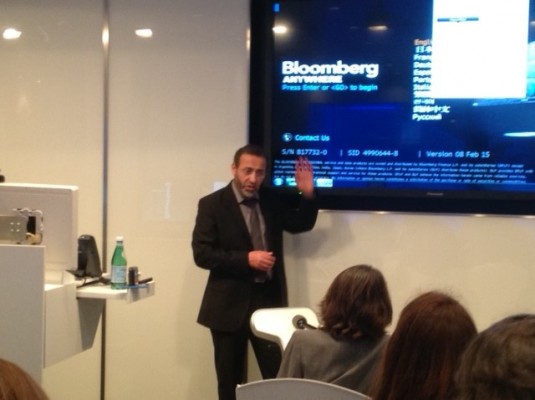Islam in France must respect and adapt to the country’s secular creed and be independent of foreign influence, but France must also better understand and respect Islamic history and its achievements, says Tareq Oubrou, rector and imam of the main mosque of Bordeaux.
“Islam has always been transmitted through cultures, so when the culture changes the relationship with religion must change as well,” Oubrou said during a March 10 meeting with over 20 AAPA members. “The culture of French Muslims is Western, so they must find a way to integrate their religion within this cultural context.”
But “integrating Muslims must also be done by recognition,” he added, suggesting eight centuries of Islamic history and its achievements in areas like math and science isn’t properly taught in French schools.
“It’s not a question of scientific charity, it’s a question of historical justice,” Oubrou said.
Efforts to craft a moderate, French brand of Islam have intensified since January’s terrorist attacks in Paris and the departure of hundreds of French to join jihadist movements in the Middle East. Oubrou said ‘jihad’ was the wrong word to use – God never asked Muslims to join the extremists’ cause, he noted.
During his hour-and-a-half meeting with reporters in Bloomberg’s Paris bureau, Oubrou also addressed issues ranging from foreign funding of mosques, to efforts to unify the country’s diverse Muslim community and the challenges of being an Imam in France, a job so poorly paid, he says, that few second-generation French Muslims are interested.
“Being an imam isn’t just a question of theology,” said Oubrou. “An imam does many things besides overseeing religion in mosques; he’s the judge, social assistant, exorcist, psychiatrist. Besides daily and Friday prayers, he’s around to resolve problems.”
Moroccan-born Oubrou is among France’s leading Muslim clerics, a theologian who jogs 10 kilometres or more in the mornings and sends his children to Catholic school. He is a member of the Union of Islamic Organizations of France (UOIF) which has roots in Egypt’s Muslim Brotherhood.
But Oubrou said the UOIF was the first to defend a French Islam and to disassociate itself from its ethnic origins. Still, he said, it needed to better adapt to today’s realities in France if it wanted to continue attracting a “clientele,” and spend less time battling over relatively “minor” issues like the wearing of headscarves or Muslim burial grounds.
Because the job of imam is so poorly paid “there’s a preference to import imams who may have fewer demands than to employ a second-generation Muslim who has a certain notion of comfort,” Oubrou said.
On radical Islam, Oubrou likened jihadist fighters to ordinary thugs with little knowledge of the Muslim religion. He said the ability of imams to curb extremism in today’s Internet-connected world was limited. “You can’t expect imams to resolve problems created by society,” he said.
At the same time, he said, imams have “dismantled thousands of bombs with their prevention work, but nobody talks about it.”
On creating an Islam of France, Oubrou said former President Nicolas Sarkozy was right to prod the country’s fractured Muslim community to organize itself. But he said the result – the French Council of the Muslim Faith (or CFCM, which his own UOIF is not part of) – continues to have ties to North African countries, rather than being an independent and purely French body.
Oubrou said most imams in France speak out against violence, and that only a small percentage of foreign-born imams “don’t understand that fragile people can misunderstand their discourse.” He said training imams should reflect a kind of “preventative theology,” that emphasizes a careful interpretation of the Koran.
Oubrou also said the Internet’s ascendancy has diluted the influence of imams in their mosques – even though, he added, the majority of those attending French mosques today are young people. And he suggested, in a world where there are no longer any overarching causes, extremist groups are attracting young people who want to fight against injustice – however misplaced their target.
“Islam has become what communism was a century ago, the religion of the oppressed,” he said.
“Today, there’s no more communism or socialism to mobilize the masses, so recruitment comes through religion,” he added. “Whether it’s Judaism, Christianity or Islam, religion has become the mobilizer.”
-Lisa Bryant
